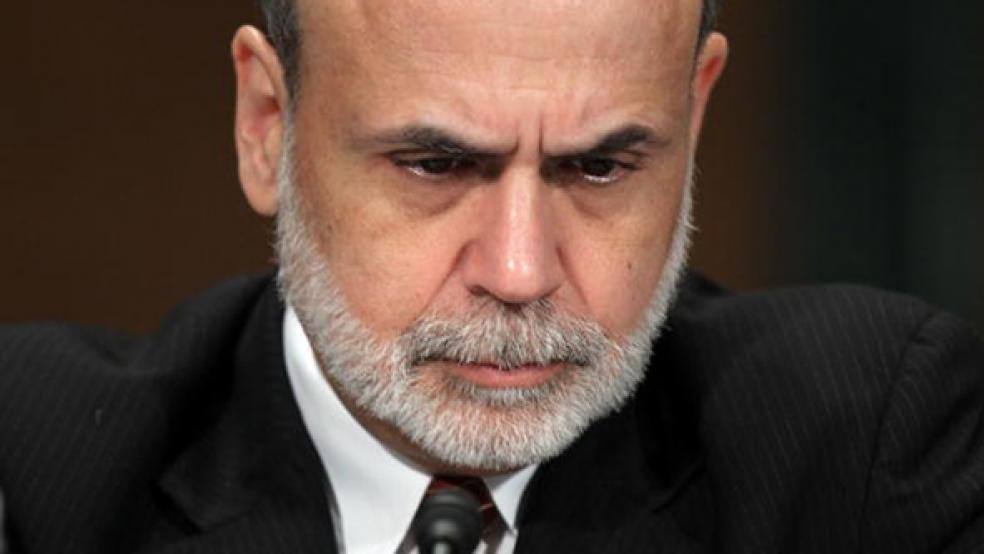Paul Krugman vaulted over the line recently, issuing an ad hominem attack on Fed Chair Ben Bernanke for not doing enough to boost the economy. Krugman’s anxiety that the stuttering recovery will bounce President Obama from the White House seems to have loosened his already-fragile grip on reality. His conclusion – that “right-wing bullying” is holding Bernanke back – seems especially nonsensical, even for the truculent Mr. Krugman.
Dallas Fed President Richard Fisher’s response? “No one bullies Ben Bernanke." Fisher was not the only speaker at the Milken Institute Global Conference taking place in Los Angeles who would challenge Mr. Krugman’s highly partisan worldview.
Real estate powerhouse Barry Sternlicht said Ben Bernanke is doubling as Barack Obama’s campaign chairman, doing his best to guarantee the president’s reelection. The CEO of Starwood Capital Group called the Fed Chairman’s easy money policy a “put” under the stock market and observed that “Obama’s fortunes rise and fall” with the S&P 500.
RELATED: Fed Faces New Challenge from the Left
For the distraught Krugman, Bernanke’s best is evidently not good enough. Krugman accuses his former colleague of passivity, writing in The New York Times Magazine that Bernanke is failing American workers. Given the Fed’s aggressive quantitative easing (which, according Richard Fisher of the Dallas Fed, has expanded the central bank’s balance sheet by a factor of 3), as well as our near-zero interest rates, it is a controversial stance.
Krugman rests his case on the earlier writings of the Fed Chair, in which Bernanke criticized the Japanese central bank for its unrewarding caution. In his days as a Princeton academic, the future banker wrote that the authorities should have pushed harder to levitate that economy out of its prolonged slump. Krugman wonders: Where did Bernanke the activist go?
Specifically, Bernanke once advocated that Japan’s bank could “take a larger role in financial markets.” Krugman suggests that the Fed could travel this road as well. Having driven down short-term rates, the bank could step harder on longer-term rates. Krugman considers insufficient “Operation Twist,” in which the Fed bought $2 trillion in long-term bonds and mortgage-backed securities for just that purpose. On the contrary, many analysts think another round of quantitative easing might spark a weakening U.S. dollar and consequent jump in commodities prices.
Krugman dismisses this risk, noting that markets have all but ignored Fed machinations up until now. He’s right – but not because quantitative easing has no consequences. Rather, the U.S. dollar and the demand for U.S. Treasuries have been propped up by Europe’s economic turmoil. Money from around the globe has flowed into the U.S. due in part to worries about rival “safe havens,” cushioning the impact that QE might otherwise have had on our markets.
RELATED: The Fed’s IOUs Can Cripple the Economy in 2013
Willem Buiter, Citigroup’s Chief Economist, says the U.S. is lucky to still have a reserve currency, but that this “temporary privilege is eroding fast.” He points out that our country’s fiscal position is “worse than that of Europe as a whole” and says that the “U.S. will not be in a position of defying the law of gravity forever.” He foresees an inevitable re-pricing of U.S. risk, and long rates moving significantly higher in the next year or two.
Like Buiter, Barry Sternlicht sees the U.S. living on borrowed time. He is especially concerned that the U.S. is financing long-term obligations – Medicare, Social Security and the like – with short-term borrowings. He describes our monetary policy as “financial suicide”; he says the Fed’s loose money approach makes the “Greenspan housing bubble look like a warm-up act.”
In contrast, Krugman wants the Fed to reboot U.S. growth by raising our inflation target. He thinks higher inflation expectations would convince companies and investors that holding cash is a bad idea. Bernanke has tip-toed into this sphere, broadcasting that rates will stay low through 2013 and into 2014. Krugman says this isn’t enough; he wants Bernanke to raise the inflation target (now at 2 percent) for the next ten years.
Fisher disagrees, and voted against guaranteeing low rates through 2014. A known inflation hawk, he argues that monetary policy alone cannot boost the economy. He likens easy credit to putting fuel in the tank. What counts, he says, is who has their foot on the accelerator.
Fisher notes that the system is awash in liquidity; there is $1.7 trillion in excess bank reserves, more than $2 trillion on corporate balance sheets, and another $2 trillion in non-depository institutions. He argues that this money is not being put to work because of failures in fiscal policy. Businesses, he says, face too much uncertainty over taxes and regulations, making them reluctant to invest. In a panel on job creation, Javier Palomarez, president of the Hispanic Chamber of Commerce ,and Rafael Pastor, head of Vistage International, agreed that the Obama government was hurting, not helping.
Krugman’s frustration is understandable. Many Americans are still without jobs, and income growth is tepid. However, driving the nation full tilt towards the next financial cliff is not the answer. Leadership and pro-business measures such as those adopted in Canada and Germany in recent years – an approach consistently undervalued by the Obama White House – would better help us get back on the speedway.
Fortunately, the Fed is in the hands of a sober driver, who appears immune to right-wing bullying. Let us hope he will resist Krugman’s left-wing bullying as well.






